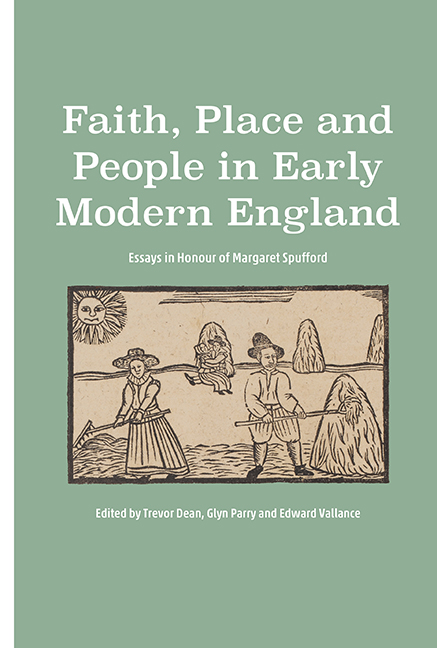Book contents
- Frontmatter
- Dedication
- Contents
- List of Illustrations
- List of Contributors
- Record Office Abbreviations
- Acknowledgements
- Introduction
- Margaret
- Part I Faith
- 1 Religious Divisions in the Localities: Catholics, Puritans and the Established Church before the Civil Wars
- 2 ‘Neither Godly professors, nor dumb dogges’: Reconstructing Conformist Protestant Beliefs and Practice in Earls Colne, Essex, c.1570–1620
- 3 The Sad Fortunes of the Reverend John Perkins: Scenes of Clerical Life in Late Seventeenth-Century England
- Part II Place
- Part III People
- Bibliography of Margaret Spufford's works
- Index
- Tabula in Memoriam
3 - The Sad Fortunes of the Reverend John Perkins: Scenes of Clerical Life in Late Seventeenth-Century England
from Part I - Faith
Published online by Cambridge University Press: 19 July 2019
- Frontmatter
- Dedication
- Contents
- List of Illustrations
- List of Contributors
- Record Office Abbreviations
- Acknowledgements
- Introduction
- Margaret
- Part I Faith
- 1 Religious Divisions in the Localities: Catholics, Puritans and the Established Church before the Civil Wars
- 2 ‘Neither Godly professors, nor dumb dogges’: Reconstructing Conformist Protestant Beliefs and Practice in Earls Colne, Essex, c.1570–1620
- 3 The Sad Fortunes of the Reverend John Perkins: Scenes of Clerical Life in Late Seventeenth-Century England
- Part II Place
- Part III People
- Bibliography of Margaret Spufford's works
- Index
- Tabula in Memoriam
Summary
In her fictional description of a dinner party at ‘Milby’ (Warwickshire) in the late 1820s, the novelist George Eliot presents pen portraits of six clergymen around the table who may be regarded as archetypes of the clerical profession: the hospitable minister, at home entertaining guests in his well-appointed vicarage; the clerical magistrate, invariably feuding with his quarrelsome congregation; the misanthropic evangelical, always running into debt; the intellectually ambitious Cambridge graduate, with aspirations to be a poet; the energetic pastor, fastidious in his self-presentation; and the frustrated incumbent of an impoverished rural living, destined for a successful career as a metropolitan lecturer. A seventh clergyman seated in the Milby vicarage dining room is, however, singled out by Eliot for praise as ‘the true parish priest’:
the pastor beloved, consulted, relied on by his flock; a clergyman who is not associated with the undertaker, but thought of as the surest helper under a difficulty, as a monitor who is encouraging rather than severe, [and who] has the wonderful art of preaching sermons which the wheelwright and the blacksmith can understand; not because he talks condescending twaddle, but because he can call a spade a spade, and knows how to disencumber ideas of their wordy frippery.
Indeed, Eliot's ‘true parish priest’, Martin Cleves, stands as the ideal type of country parson, a man who might be described in the rough idiom of Warwickshire labourers and artisans as an ‘uncommon knowin’, sensable, free-spoken gentleman; very kind and good natur'd too’.
Eliot's vivid characterisation of the ideal parish clergyman is particularly resonant in a volume of essays dedicated to the memory of Margaret Spufford, not least because it so elegantly weaves the minister into the social and economic fabric of the local community in which he lived. Although Spufford's work on the history of religion is primarily associated with her project to establish the descent of rural dissent, her commitment to demonstrate ‘the importance of religion in the sixteenth and seventeenth centuries’ invariably led her back to the relationships between clergymen and parishioners as people. Although famous for her insistence that religion was primarily a matter of faith and was therefore essentially to be understood as a spiritual relationship between believers and their God, she was always keen to locate religious practice in its social and economic context.
- Type
- Chapter
- Information
- Faith, Place and People in Early Modern EnglandEssays in Honour of Margaret Spufford, pp. 70 - 92Publisher: Boydell & BrewerPrint publication year: 2018



